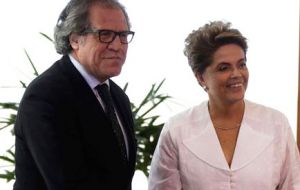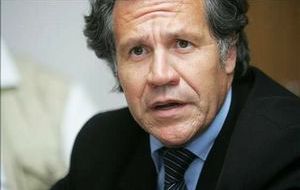MercoPress. South Atlantic News Agency
OAS chief meets Rousseff and disagrees with the impeachment process
 Almagro said OAS has made a detailed analysis of the impeachment process against Dilma, and has concluded that it does not fit within the rules of this process.
Almagro said OAS has made a detailed analysis of the impeachment process against Dilma, and has concluded that it does not fit within the rules of this process.  Rousseff is being accused of poor administration of public resources in 2014. This is political, and does not merit an impeachment process.
Rousseff is being accused of poor administration of public resources in 2014. This is political, and does not merit an impeachment process.  Indecent and criminal acts should be judged by decency and public integrity, not vice versa, affirmed Almagro.
Indecent and criminal acts should be judged by decency and public integrity, not vice versa, affirmed Almagro. Brazilian president President Dilma Rousseff received on Friday in Brasilia the Organization of American States, (OAS), Secretary General Luis Almagro to discuss on the current situation in the country, some regional issues and the role played by OAS.
President Rousseff referred to the political situation in Brazil and the impeachment process she may have to face.
Almagro said that OAS has made a detailed analysis of the impeachment process against Dilma, and has concluded that it does not fit within the rules that govern this process.
There is no criminal accusation against the President; rather she has been accused of the poor administration of public resources in 2014. This is an accusation that is political in character, and that does not merit an impeachment process.
This analysis raises doubts that we have also been reflected in Brazilian society and even within the system of public prosecution, as was seen in a letter signed by 130 members of the public prosecutor’s office of Brazil:
(…) 2. It is well known that the impeachment trial for a crime of responsibility attributed to the President of the Republic is actually a juridical-political trial, which does not remove the requirement for certainty regarding the facts attributed to the aforementioned official.
3. Without certainty in the process, a positive resolution of the impeachment is flagrantly illegal, as it signifies a conclusion without motive, thus arbitrary, based on opinions that, obviously, lack clear-cut proof.
4. The facts articulated in the preliminary proceedings in the current impeachment process, and how they were handled by the preparatory committee to support the plenary decision by the Members of Parliament, with all due respect, are far from supporting indications of a crime of responsibility, let alone certainty of such a crime.
5. In fact, the issue of the additional credit decrees to reassign spending limits in certain public policies authorized by law, and the delays in the transfer of Union subsidies to public banks to cover for expenditures of institutions with loans made to third parties through government programs, are both procedures contemplated within the law, in legal opinions and in the understanding of the TCU (Federal Accountability Court), which always considered such measure as legal, until the end of 2015, when the understanding of the Court changed.
6. Furthermore, there is no crime without a previous law defining it, and much less without the understanding of previous jurisprudence. The opposite would result in an absurd legal uncertainty, even with respect to more than half of all governors and innumerable mayors who have always used and continue using the same measures that supposedly support the impeachment process against the President.
7. Therefore, the proof of a crime of responsibility having being committed does not exist, according to art. 85 of the Federal Constitution.”
In addition, it must be highlighted that a presidential system like the one in Brazil–and the vast majority of those in the Western Hemisphere, except for the English-speaking Caribbean—cannot operate out of the blue as if it were a parliamentary system, moving for impeachment, in this case of the chief executive, because of a shift in the political balance of a coalition government.
In effect, the sustainability of the presidential system does not depend solely on the legislature and the alliances generated therein. This is a reality that is useful in terms of efficiency in legislating and governing, but does not substitute for popular and sovereign support generated at the moment of voting for the current President. This equation of popular sovereignty cannot be changed for politically opportunistic reasons.
If those who wrote the Constitution had wanted to establish a kind of parliamentary or semi-parliamentary solution, they would have structured it in that way and the logic of formation of governments, designation of the cabinet, the political responsibility and the fall of governments would be completely different.
We are not making a judgment as to which kind of system—presidential or parliamentary–is better, because that depends on the social and political contract of every society. But the organization of the Brazilian constitutional system is clear and, for that reason, it has established the constitutional limits for the exercise of an impeachment process. To ignore those limits affects the very structure of how the system operates, and distorts the forces and operation that the Constitution and the laws should have.
Our concern is not isolated, because the United Nations system and the Union of South American Nations (UNASUR) have voiced similar concerns. The United Nations system has noted:
“Brazil is a very important country and any political instability is a social concern for us,” said the U.N. Secretary General, Ban Ki Moon, to the Brazilian press last week. “We repeat the request to guarantee that the judiciary be respected, that the democratic institutions that Brazil fought for be respected and not be undermined by the process,” said Ravina Shamdasani, Spokesperson for the U.N. High Commissioner for Human Rights.
For its part, UNASUR highlighted that: The President can only be tried and dismissed–revoking the popular mandate that elected her–for criminal offenses in which her willful and active participation can be proven. To accept that an executive can be removed from office for alleged failures in administrative acts leads to the dangerous criminalization of governance simply for reasons of a political nature.
Brazil has always been an example of democracy in the Hemisphere, and we all need for it to continue to be so. That is why the international community is sending these messages.
Indecent and criminal acts should be judged by decency and public integrity, not vice versa, affirmed Almagro.
This principle, moreover, will be essential in the fight against the corruption that is plaguing the country and that must be fought to the end. It is in the interest of all that the investigation is completed and arrives to the final consequences.
Finally Almagro said that acknowledgement of the situation must be sustained in truth and justice, and political acknowledgement is only valid when it is expressed according to the existing institutions in the country.




Top Comments
Disclaimer & comment rules-

-

-

Read all commentsAlmagro's ALIVE!
Apr 16th, 2016 - 10:47 am 0The former Foreign Minister for Uruguay, but not so secret rent-boy for Dovena the bloated argie 'Ambassador and confident of TMBOA who operated in our country as if he owned it (like all argies who come to PdleE).
Mujica only did one sensible thing during his presidency and that was to get rid of this arsehole.
Of course he disagrees with the impeachment, it's too close to how he would be thrown out of office if they could find somebody else, preferably with a spine and a brain, to do his job.
It shows just how dumb DumbAss Dilma is getting close to this idiot.
Will it help her? Ha, ha, ha, she is beyond help whether she survives the vote or not, she is as good as finished now.
In view of her low popularity - around 10% largely amongst the majority of the ignorant population - and due to her own incompetence to govern; more dignified way out for her will be to resign on her own.
Apr 16th, 2016 - 11:21 am 0But instead; if she prefers to be kicked-out; then that's what she thinks she deserves!
Wow talk about outside influence. Isn't this the sort of influence and imperialism that so many politicians in South America rail against continually?
Apr 16th, 2016 - 11:54 am 0Different when it appears to be on your side!
However it is interesting that the author of this piece (either not fluent in English or subject to an extremely bad translation) states ”Our concern is not isolated, because the United Nations system and the Union of South American Nations (UNASUR) have voiced similar concerns....”
How did the author turn the following quotes into similar concerns?
“Brazil is a very important country and any political instability is a social concern for us,” U.N. Secretary General, Ban Ki Moon.
“We repeat the request to guarantee that the judiciary be respected, that the democratic institutions that Brazil fought for be respected and not be undermined by the process,” Spokesperson for the U.N. High Commissioner for Human Rights Ravina Shamdasani.
Neither one of those quotes is support for Roussef!
They are support for Brazil's constitution and Brazilian institutions. Neither of which are Roussef, she is subservient to both those.... not that you would believe it the way she has acted.
Commenting for this story is now closed.
If you have a Facebook account, become a fan and comment on our Facebook Page!